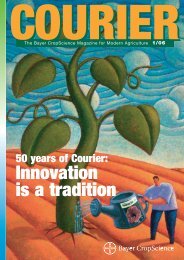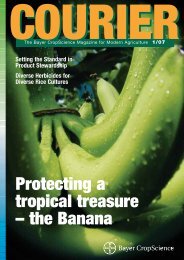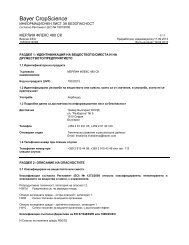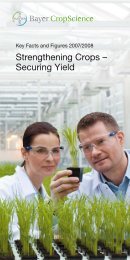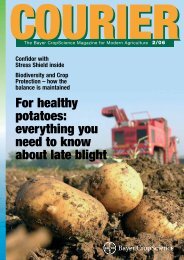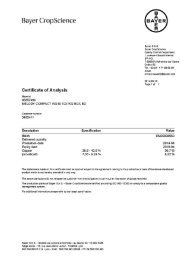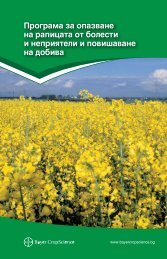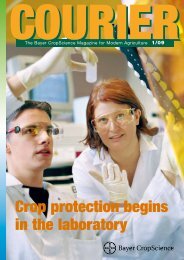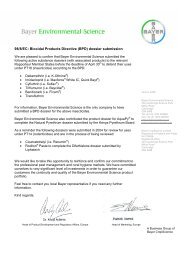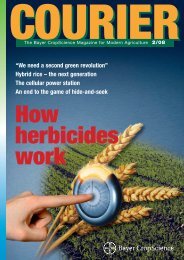Potatoes⦠- Bayer CropScience
Potatoes⦠- Bayer CropScience
Potatoes⦠- Bayer CropScience
You also want an ePaper? Increase the reach of your titles
YUMPU automatically turns print PDFs into web optimized ePapers that Google loves.
This is HZPC<br />
HZPC Holland B.V. came into being in 1999 through the merging of two large seed<br />
potato export companies in the Netherlands: Hettema and De ZPC, each with more<br />
than 100 years of experience behind them. The HZPC headquarters are located in<br />
Joure (Friesland, Netherlands).<br />
The core activities of HZPC are breeding, growing and selling seed potatoes.<br />
HZPC is one of the world’s largest commercial enterprises in seed potatoes.<br />
Approximately 620 seed potato growers - with a total acreage of almost 12,000<br />
hectares - are affiliated to HZPC Holland. In recent years, total production has<br />
varied from 330,000 to 400,000 tonnes of seed potatoes. Eighty to 90 percent of<br />
this volume is destined for export. HZPC thus accounts for more than 40 percent<br />
of the total Dutch seed potato export volume.<br />
HZPC exports seed potatoes to 80 different countries. The company has subsidiaries<br />
in Portugal, Spain, France, Poland, the United Kingdom, Canada, Argentina,<br />
Russia and Scandinavia.<br />
To support its core activity (seed potatoes), HZPC also deals in ware potatoes.<br />
In this way HZPC’s protected potatoes are promoted within the supermarkets.<br />
Gerard Backx, General Director of HZPC<br />
Holland B.V.: “As a leading seed potatoproducing<br />
country, we shall have to keep<br />
up in terms of knowledge, quality and<br />
modernization.”<br />
farmers are growing it themselves. As a<br />
result, the concept of license payments has<br />
got lost to some extent. In order to chart<br />
the seed potato routes – and thus the<br />
license obligations – HZPC recently<br />
opened an office in Argentina. For a number<br />
of other countries, a license fee is<br />
demanded when the seed potatoes are<br />
purchased: the customer is then free to<br />
grow the variety once or twice.<br />
Of all the seed potatoes that HZPC and Agrico sell, 75 to 85 percent is destined for export. About half are<br />
transported to their destination by ship.<br />
a breeder’s rights (license) to a variety<br />
remain valid for 30 years. “We therefore<br />
have to make the maximum profit from a<br />
variety during that period,” is how HZPC<br />
Director Backx summarizes an important<br />
aim of the company. Varieties such as<br />
Spunta and Desirée – which can be grown<br />
freely because the license period has<br />
expired – have thus gained two faces. “On<br />
the one hand, they are an excellent way of<br />
displaying our achievements of the past;<br />
but on the other hand, they no longer bring<br />
in any license payments, and they sometimes<br />
inhibit the breakthrough of new<br />
varieties,” is how Backx describes the<br />
sometimes tricky situation.<br />
Payment is not always a matter of course<br />
In addition to the dilemma of the older varieties<br />
that sometimes sit in the way, the<br />
payment of the license fees is sometimes<br />
an awkward point. Of the 80 countries to<br />
which they export, there is ‘a handful’<br />
that do not take licenses very seriously,<br />
according to Backx. In one particular case,<br />
it is unwillingness; but more often it is a<br />
question of inadequate administration or<br />
organization. As an example, Backx mentions<br />
Argentina, where the French fries<br />
variety Innovator has made a considerable<br />
breakthrough in recent years. Initially, the<br />
variety was only grown by the industry.<br />
But now that the variety has proven itself,<br />
Licenses vital in order to pay for<br />
breeding work<br />
According to Agrico Director Van Hoogen,<br />
it is not only distant countries that cause<br />
problems with license payments. Cases are<br />
also sometimes brought against growers in<br />
Belgium, France, Germany and the United<br />
Kingdom who do not take licenses seriously.<br />
An awkward point here is that although<br />
these countries respect the license legislation,<br />
a lot of negotiations are still ongoing<br />
about the precise method of payment. “As<br />
a result, Agrico misses out on many millions<br />
of Euros per year. And we need that<br />
money to offset the breeding costs.”<br />
Diseases<br />
In the area of diseases and infestations, the<br />
prevention and/or control of the Erwinia<br />
bacterium (cause of black leg and stalk<br />
rot) will continue to be a major challenge.<br />
Despite the numerous efforts that have<br />
been made in research and cultivation in<br />
recent years, the problem is still increasing.<br />
Van Hoogen anticipates that the<br />
Netherlands is not yet free of the bacterial<br />
problem. “You can’t do anything to combat<br />
16 COURIER 1/08



